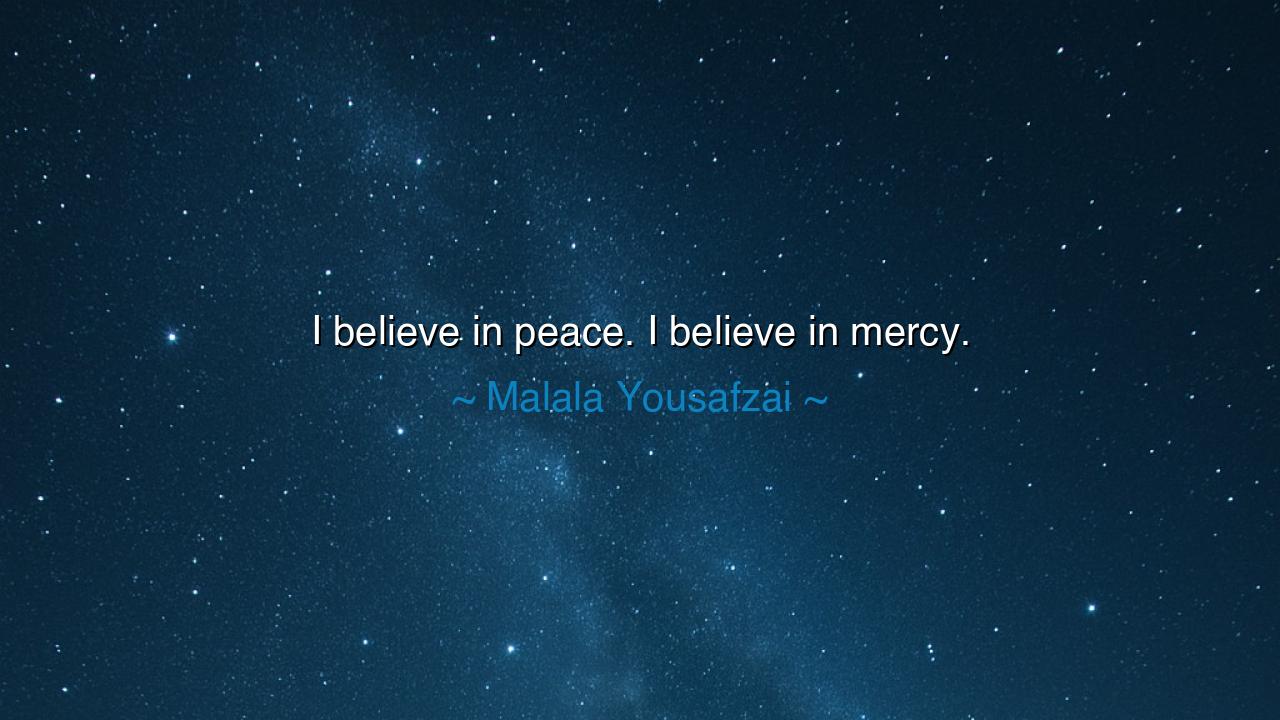
I believe in peace. I believe in mercy.






In the voice of the young, wisdom sometimes rises clearer than in the counsel of kings. So declared Malala Yousafzai, child of struggle and champion of learning: “I believe in peace. I believe in mercy.” Simple in sound, her words strike with the weight of eternity, for they carry not the rhetoric of power, but the testimony of one who has suffered and yet chosen light over darkness. These words are not abstract philosophy—they are born of blood, exile, and survival.
To proclaim belief in peace is to declare faith in a world beyond violence. Malala spoke as one who had faced the muzzle of the gun, who had known the cruelty of those who feared the power of a girl with a book. Many in her place would have chosen vengeance, would have lifted a clenched fist in reply to those who sought to silence her. Yet she chose instead the open hand. She chose to believe that the path of reconciliation is stronger than the path of revenge. In this, she stands with the greatest of the ancients, who taught that the cycle of wrath can only be broken when one dares to lay aside the sword.
And to proclaim belief in mercy is perhaps even greater, for mercy is peace extended beyond oneself. Mercy is peace made flesh, peace offered not only to the innocent, but even to the guilty. To show mercy is to see humanity in the one who wronged you, to refuse the fire of hatred and instead kindle the light of compassion. Malala’s words echo those of sages across the ages, who taught that forgiveness is not weakness, but the highest strength, for it frees both the giver and the receiver from the chains of anger.
History testifies to this truth. Consider Abraham Lincoln, who, after years of civil war, spoke not of punishment for the defeated, but of reconciliation: “With malice toward none, with charity for all.” He understood, as Malala does, that nations and peoples cannot be rebuilt upon vengeance, but only upon mercy. And so too did Nelson Mandela, who emerged from prison not calling for blood, but offering peace to his jailers. In their mercy lay the healing of nations. In their refusal to answer cruelty with cruelty lay the seed of a future where unity could be born.
The lesson here is clear: peace and mercy are not passive, but active choices. They are not the easy path of surrender, but the hard path of courage. It is easy to strike back, easy to curse, easy to mirror hatred with hatred. But to stand wounded and still extend kindness—that is divine strength. Malala’s life itself bears this truth: she believed in peace and mercy not in times of comfort, but in the shadow of violence. Thus her words shine not as mere ideals, but as living proof that they can be embodied.
What then must we, who hear these words, do? First, we must guard our hearts. In our own lives, when wronged by friend, by family, or by stranger, we must resist the temptation to return harm for harm. Instead, we must seek understanding, we must extend forgiveness where possible, and we must nurture peace where anger threatens to grow. Secondly, we must practice mercy in small ways daily—through patience with others, through kindness to the undeserving, through compassion to those who stumble. For great acts of mercy are born from small mercies practiced in ordinary life.
Thus, Malala’s words become an inheritance for all generations. “I believe in peace. I believe in mercy.” Let us not treat them as mere phrases, but as a creed for living. For if each of us carried peace within and mercy without, then wars would falter before they began, hatred would weaken in the face of compassion, and the world would be reshaped not by the hand that strikes, but by the hand that heals. Let us, therefore, take her words into our souls, and let them guide us as lamp and staff, until the day when peace and mercy are no longer beliefs but the very breath of our common life.






AAdministratorAdministrator
Welcome, honored guests. Please leave a comment, we will respond soon